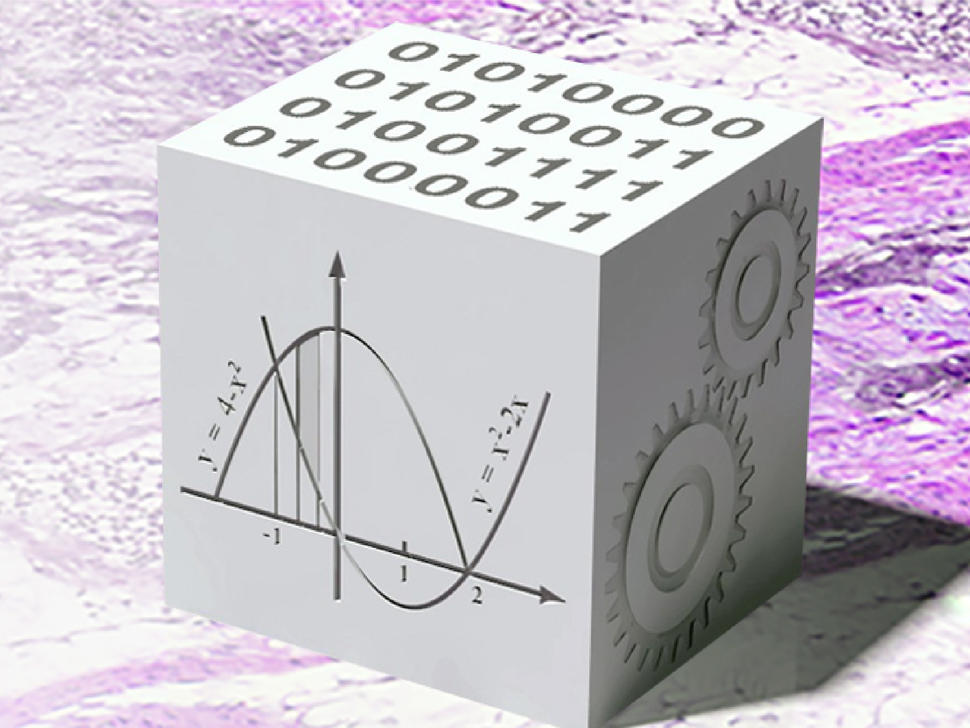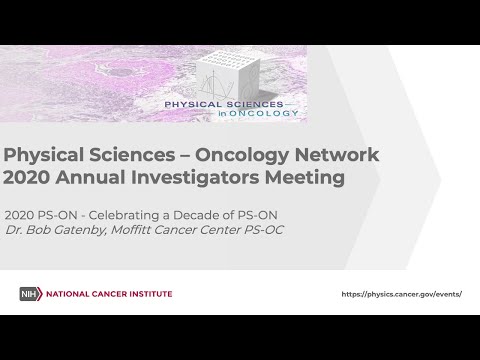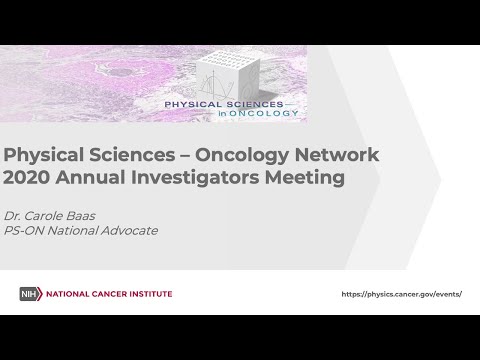Impact of Physical Sciences in Oncology Research
Since 2009, PS-ON has supported physical sciences in oncology research addressing complex and challenging questions in cancer research from a physical sciences perspective.
Highlights of research advances from this NCI program include:
- Determined mechanisms behind the generation of mutations in cancer genomes based on 3-D architecture and polymer physics
- Optimization of dosing strategies for lung and brain cancer treatment using computational physics and evolutionary theory
- Progress in understanding the role of mechanics in tumor progression and metastasis using physical parameters
- Determined the 3-D structure of protein complexes responsible for regulating gene expression in cancer using computational approaches
Additionally, PS-ON workshops identified opportunities and challenges in tissue engineering for cancer research, which guided the development of the Cancer Tissue Engineering Collaborative (TEC).
PS-ON Funding Opportunities
- PAR-25-321: Exploratory/Developmental Bioengineering Research Grants (EBRG) (R21 Clinical Trial Optional)
- PAR-24-325: Bioengineering Partnerships with Industry (U01 Clinical Trial Optional)
PS-ON News
Two new research projects joined PS-ON in Fall 2024!
Drs. Marc Birtwistle, James Gallo, and Lao Yeh-Hsing with the Clemson University PS-ON Project are creating computational models of cell state networks in glioblastoma, including transitions between drug resistant and sensitive states, to develop combination therapy strategies.
Drs. Russell Rockne, Ya-Heui Kuo, and Guido Marcucci with the City of Hope PS-ON Project are developing state-transition based mathematical models to predict individual treatment responses and design adaptive therapeutic approaches for acute myeloid leukemia.
PS-ON Associate Membership
The goal of the PS-ON Associate Membership program is to provide an opportunity for those who are not participating on a PS-ON award to engage in PS-ON activities and potentially form collaborations with PS-ON funded investigators.
Membership would allow domestic/foreign investigators or research advocates who are not directly supported through a PS-ON award but are doing relevant research to be able to (but not required to):
- Attend Steering Committee meetings as non-voting participants.
- Attend Annual Investigator meetings.
- Attend and participate in working groups or interest groups.
- Have an opportunity to collaborate via trans-network projects and administrative supplements.
It is envisioned that the opportunity would be extended to colleagues and in particular with postdocs who have moved to independent faculty positions. Those who identify as being from underrepresented groups are encouraged to apply for Associate Membership.
To learn how to apply, please contact Dr. Eric Johnson Chavarria.
PS-ON Resources for Researchers
The Cancer Complexity Knowledge Portal contains the latest available resources generated through the PS-ON. Information in the database includes:
- Grants
- Investigators
- Publications
- Datasets
- Tools
PS-ON Patient Advocacy
Research advocates play an important role in the network, and have been important members of the program since it started.
PS-ON currently supports research advocacy efforts that intersect with Junior Investigators to Early-Stage Investigators. PS-ON highly encourages the participation and support of cancer research advocates with physical sciences - oncology research project activities, including advocacy efforts that intersect with Junior Investigators to Early-Stage Investigators.
Contact for PS-ON
For additional information about PS-ON, please contact Dr. Eric Johnson Chavarria or the Physical Sciences in Oncology Team.
Funded Projects
Physical Sciences – Oncology Projects (PS-OPs)
Multi-Consortia Coordinating Center (MC2 Center)
| Institution | Principal Investigator(s) | Project Title |
|---|---|---|
| Sage Bionetworks | Julie A. Bletz, James A. Eddy | Multi-Consortia Coordinating Center (MC2 Center) for Cancer Biology: Building Interdisciplinary Scientific Communities, Coordinating Impactful Resource Sharing, and Advancing Cancer Research |
Past Projects
Physical Sciences – Oncology Centers (PS-OCs)
| Institution | Principal Investigator(s) | Project Title |
|---|---|---|
| Columbia University | Raul Rabadan, Antonio Iavarone | Topology of Cancer Evolution and Heterogeneity |
| Cornell University | Claudia Fischbach-Teschl, Lewis C. Cantley | Center on the Physics of Cancer Metabolism |
| Dana-Farber Cancer Institute | Franziska Michor, Eric. C. Holland | Evolution and Treatment Response of Brain, Breast, and Hematologic Malignancies |
| Houston Methodist Research Institute | Haifa Shen, Jenny C-N Chang | Center for Immunotherapeutic Transport Oncophysics |
| Johns Hopkins University | Denis Wirtz, Kenneth J. Pienta | The Johns Hopkins Physical Sciences Oncology Center |
| Massachusetts Institute of Technology | Forest M. White, Jann N. Sarkaria | MIT/Mayo Physical Sciences Center for Drug Distribution and Efficacy in Brain Tumors |
| Moffitt Cancer Center | Robert A. Gatenby, Alexander R.A. Anderson, Robert J. Gillies | Cancer as a Complex Adaptive System |
| Northwestern University | Thomas V. O’Halloran, Jonathan D. Licht | Spatio-Temporal Organization of Chromatin and Information Transfer in Cancer |
| University of Minnesota | David J. Odde, David A. Largaespada, Steven S. Rosenfeld | Center for Modeling Tumor Cell Migration Mechanics |
| University of Pennsylvania | Dennis E. Discher | Liver Cancer: Pre-Malignant Stiffening, Membrane Transduction, & Nuclear Rheology |
Physical Sciences – Oncology Projects (PS-OPs)
PS-ON Coordinating Center
| Institution | Principal Investigator(s) | Project Title |
|---|---|---|
| Sage Bionetworks | Justin Guinney | Coordination Center for Open Collaboration in Systems Biology |


